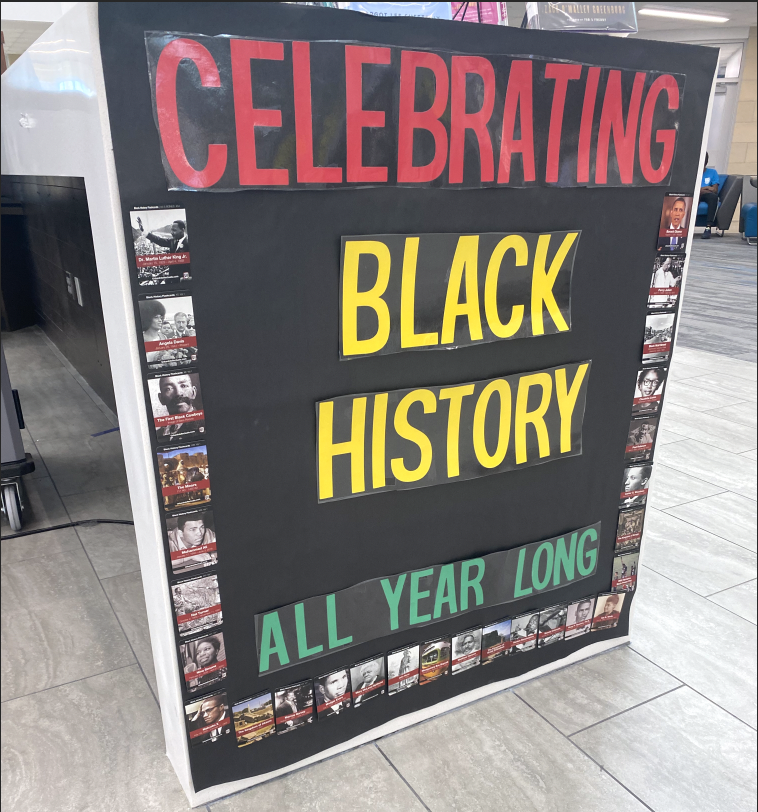Origins of Black History Month
Editor-in-Chief Gianna Ortner-Findlay snaps a shot of the Black History Month display in Rock Hill High School’s library. “Black History Month is observed from Feb. 1st-28th,” Ortner-Findlay said, “and is a month that highlights and celebrates the historical influence that Blacks and Black Americans have had.” Black History Month is an internationally observed holiday month; however, recognized at varying times of the year.
February 9, 2022
Black History Month is observed from Feb. 1-28th and is a month that highlights and celebrates the historical influence that Blacks and Black-Americans have had. This holiday has gone through several iterations, varying in length, but the one thing that hasn’t changed is observing black excellence.
“I know [Black History Month],” freshman Fatemeh Fargin said, “is a month where we celebrate Black people and their culture.”
Black History Month initially started in the United States as just a week, being created by historian Carter G. Woodson and the Association for the Study of Negro Life and History in 1926, claiming the second week of Feb. to be ‘Negro History Week.’ This week was chosen because it coincided with the birthdays of Abraham Lincoln (Feb. 12) and Frederick Douglass (Feb. 14), both birthdays celebrated in several Black communities since the late 19th century.
“Well, I know [Black History Month] is a time to celebrate the history of African Americans in this country and the trials and tribulations that they’ve gone through,” tech director Timothy Doyle said. “But, [it is] also celebrates the changes that have come in our society over the past 150 years, to celebrate those changes, but also make aware of some of those struggles and challenges that we still have as a society.”
Creating this week was a pivotal steppingstone for the fledgling Civil Rights movement by establishing an annual celebration that would help encourage the teaching of the history of Black Americans in public schools. As the years progressed, the week’s popularity created a rallying cry for the United States to endorse it as a holiday.
“I feel like it’s great that there’s a month for it and all,” Fargin said, “but like every day, we should appreciate everyone’s culture and everything like that.”
Black History Month was initially suggested by Black educators and students at Kent State University in 1969, being celebrated a year later in 1970 from Jan. 2 to Feb. 28th. Finally, after six years of unofficial celebration in different educational centers and community and culture centers, President Gerald Ford recognized Black History Month as an official festivity in 1976.
“What I like about Black History Month is that we get an opportunity to celebrate a culture that not all Americans are aware of, and not all people in the world are aware of,” Doyle said. “But, from my perspective, as a white American, I love the opportunity to celebrate my African American heroes and learn new things about African American culture.”
After establishing Black History Month in America, in 1987, the United Kingdom began honoring past and present accomplishments of persons of color by dedicating the month of October. This month was organized through the leadership of a Ghanaian analyst named Akyaaba Addai-Sebo and celebrated in London. However, this month in the U.K. also marks the accomplishments of African, Caribbean, and Asian descent compared to the United States focuses on African Americans.
“[My favorite African American difference maker is] Amanda Gorman, when she spoke at the inaugural address last year,” Fargin said, “I loved her poem; she was very good at that.”
In Germany, the month began its annual occurrence in 1990, celebrating the lives and accomplishments of black Europeans and acknowledging the experience of different perspectives, the history of civil rights in the U.S., and the effect of the apartheid in South Africa. Canada followed suit with their motion by politician Jean Augustine to have the House of Commons officially recognize Feb. as Black History Month to honor Black Canadians. It was formally recognized at the Senate through a unanimous vote in 2008.
“I love that people of color and African Americans in this country get-” Doyle said, “that we get a chance to celebrate their heritage and the culture.”
Lastly, the Republic of Ireland instituted their Black History Month in Oct. 2010, initiating the month in Cork, a fitting start as that was the site of abolition talks and the work of male and female anti-slavery societies.
“I know there are dress-up days for this month,” Fargin said, “so, I mean, I think it’s later, but when it happens, I’m going to join the dress-up days [to celebrate].”
While when and how these months are celebrated is varied, the one thing that unites them all is the use of those weeks to commemorate the historical influence and uniqueness of Black History and the substantial people that left a legacy despite hardship.
“As a musician and a piano player, my favorite jazz pianist of all time, hands down there’s no question, is Oscar Peterson,” Doyle said.”I just, I love his music, adore his music, and he was a really big inspiration to me as I was growing up and learning to play jazz piano. “
During Feb., the Hill Top Times staff highlights those that we believe have gotten lost in history and deserve a renewed spotlight, doing a small part to keep the tradition of celebrating and lifting the names of black individuals so that the general public can remember their impact.








